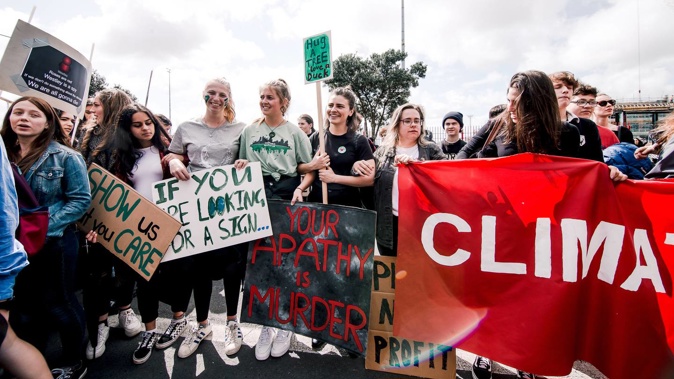
New polling has boiled the public's views towards climate change down to five types of Kiwi: with a quarter of us labelled "the alarmed".
While most of us now accept climate change is happening and caused by our own activity, we also view the crisis differently to one another.
And by understanding these differences, Massey University communications lecturer Dr Jagadish Thaker said, policymakers could reach the public more effectively.
His new analysis, which comes as the Government releases a discussion document on how the country can slash emissions, and ahead of a crucial UN climate summit in Glasgow, was inspired by US "segmentation" surveys that pin-pointed six types of beliefs.
Thaker's study, which polled nearly 1100 Kiwis, identified five, ranging from the alarmed to the dismissive.
"The alarmed are most convinced that climate change is happening, believe it is human-caused, and say that most scientists agree on climate change," Thaker said.
"They say climate change should be a very high priority for the government and that citizens should do much more to address climate change."
People in this group - making up 25 per cent of all respondents - were more likely to be female, younger, have a university education and swing left politically, with two in three voting Labour.
Another 34 per cent of Kiwis fell within the group dubbed "the concerned", who were worried, but not enough to do anything personally.
"While they are concerned about climate change, they are likely to believe climate change will harm people in New Zealand in next 10 years."
These Kiwis were slightly more likely to be women, a quarter were in retirement age, and about half described themselves as politically moderate, with two in three again voting Labour.
/cloudfront-ap-southeast-2.images.arcpublishing.com/nzme/F3X4CJ6W77Q3DLGT24ACWPKMTU.jpg)
Source / Dr Jagadish Thaker
The third group were the "cautious", making up about 12 per cent of respondents, being mostly male and "somewhat" politically conservative, and earning much more than the other segments.
"The cautious are somewhat sure that climate change is happening, and more than half believe it is human-caused and that most scientists agree that climate change is happening," Thaker said.
"They are more likely to say that climate change will start to harm people in New Zealand in 25 years. They are most willing to change their mind on climate change."
Although they were taking some measures to shrink their carbon footprint, they nonetheless saw climate change as a low priority for the Government.
/cloudfront-ap-southeast-2.images.arcpublishing.com/nzme/NHQJ5663X3ASFW6MKHQBZJKJ3M.jpg)
Source / Dr Jagadish Thaker
The "doubtful" - accounting for about 21 per cent - weren't broadly convinced that climate change was happening, with just 43 per cent attributing warming to human activity, and only a third believing there was scientific consensus.
This group - which had a roughly even gender split - was more likely to be Pakeha, hold a relatively low education, and describe themselves as somewhat conservative.
The "dismissive", meanwhile, more or less rejected anthropogenic climate change, and accounted for nearly one in 10 Kiwis.
/cloudfront-ap-southeast-2.images.arcpublishing.com/nzme/B5BEHZHV66KQGMBPG65UJFIKQI.jpg)
Source / Dr Jagadish Thaker
"They're least likely to say climate change is happening, with an overwhelming majority stating that it is not human caused and that there is no scientific consensus or scientists disagree on climate change," Thaker said.
"They're likely to dismiss climate change as a threat and say it will never harm people in New Zealand.
"Climate change is not at all important for them and are resistant to change their mind."
Thaker said the aim of the research was to help the Government, councils and other agencies to better understand and engage with people on climate.
"Individuals are more likely to attend to messages that addresses their concerns and values, from messengers they trust," he said.
"The audience segmentation helps understand these diverse messages and messengers."
A similar survey, also led by Thaker, further found Kiwis who link the emergence of infectious diseases to human impacts, like deforestation and global warming, are more likely to support Covid-19 recovery policies that put climate action at the fore.
"We often ask if people can learn about climate change through personal experience and if so, does that help increase public engagement with climate change?"
While a succession of deluges that have caused tens of millions of dollars in damage across the country might have served as their own wake-up call, Thaker pointed to a threat perhaps much more on peoples' minds: Covid-19.
The research found a strong connection between peoples' view of outbreaks resulting from environmental factors like habitat destruction, and their willingness to take measures like car-pooling, buy greener appliances, eat less meat, and back climate-focused Covid-19 recovery steps.
Interestingly, having some scientific knowledge about Covid-19 itself wasn't enough to drive the same motivations, and nor was being someone who had suffered economically over the pandemic.
"A primary challenge to communicating climate change is its abstract, global, long-term impact," he said.
"With climate impacts becoming more apparent — such as weather anomalies, extreme weather events and particularly health-related impacts — such experiences are likely to help individuals learn about climate change.
"However, unless individuals' attribute these events as related to anthropogenic climate change, public responses may be misdirected."
Thaker said that helping more people understand those climate-related effects - pandemics among them - may also help narrow the partisan divide on the issue.
Rising flood risk will drive action - study
/cloudfront-ap-southeast-2.images.arcpublishing.com/nzme/LT3RYBS4NOOD264IVMM374PTPY.jpg)
New research has suggested that rising flood risk will be what leads people to make changes to adapt to sea-level rise. Photo / Paul Taylor
Meanwhile, separate research has suggested that rising flood risk will be what leads people to make changes to adapt to sea-level rise.
"Rising seas are slowly causing a trifecta of impacts along coastlines in Aotearoa: increasingly frequent flooding, coastal erosion and even permanent inundation," said Niwa scientist Dr Scott Stephens, who led a study just published in the Journal of Marine Science and Engineering.
"Our research shows that it's the first of these three impacts - increasing flood risk - that's likely to be the main driver of adaptation efforts by coastal communities, and this tipping point is likely to be reached within two to three decades - sooner than many of us expect."
The research was carried out in Tauranga, after councils in the area commissioned coastal modelling by Niwa and Tonkin and Taylor, but its findings could likely be applied across New Zealand, Stephens said.
"There are a number of properties around Tauranga Harbour that are built high on coastal cliffs, and for these people, erosion is the number one concern," he said.
"But far more properties are built in places that currently experience coastal flooding, or soon will. This might currently only happen once every hundred years on average, but with rising seas it could increase to at least a five-yearly event within just two to three decades.
"Many New Zealand councils already have maps of one-in-100-year coastal-flood zones. These maps provide two to three decades 'lead-in' time for an undesirably frequent 'adaptation tipping point' for coastal property."
Coastal flooding was defined as flooding of the land by the sea rather than rainfall or rivers.
It could occur during very high tides and is often exacerbated by storm surges - when low atmospheric pressure and strong winds drive the sea over land, resulting in very high storm tides.
"Frequent flooding is undesirable for communities. Adaptation actions include things like building new seawalls or other protections to mitigate coastal flooding, but these may not be the best long-term solution."
He said other adaptive actions such as moving away from the coast could be driven by property owners facing difficulty obtaining insurance or mortgages for properties, or by design through proactive policy rules.
As part of the work, Stephens' team compared static and dynamic models in terms of impacts and timeframes for coastal flooding, erosion and inundation.
Dynamic models used detailed hydrodynamic models to simulate the overland flow of water in a physically realistic way.
In contrast, static models are much simpler, and used a so-called "bathtub" method, assessing whether places will flood based on their elevation alone.
The researchers found that the static model underestimated land and building exposure by up to 2.3 times compared with the dynamic model.
"This is compelling evidence for using dynamic models to support adaptation planning."
Take your Radio, Podcasts and Music with you









